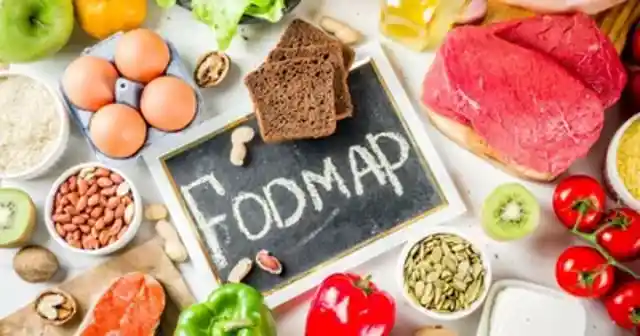Milk
You may have heard of lactose intolerance - in fact, you might even suffer from it without realizing. Lactose is the sugar found in cow's milk, goat's milk and sheep's milk, and it can be tricky for some to digest. There are also people who suffer specifically from cow's milk intolerance, which isn't the same thing. In fact, even people without a diagnosed condition can find lactose hard to fully digest.


If you are struggling with lactose, even if you don't have a known intolerance, you may get bloating and gas. Over time that can build up and lead to worse (the dreaded D word - diarrhea). It may be worth trying alternative milks, such as nut or soya milk, and if you find that your cramps and gas lessen, lactose might be the cause.
Soup
You might think, come the winter months, that a nice can of soup is a great option for your dietary welfare. After all, they're comforting, loaded with vegetables and tasty protein - nutritious and delicious, right? Well you wouldn't necessarily be wrong, but then again, lots of tinned soup is loaded with salt.


Salt is good in moderation - one of those things that our bodies need in small amounts, but convenient foods are often laden with. Canned soup can contain more than 700 milligrams of sodium. For reference, the WHO recommends less than 2000 mg/day, so that little tin of soup is a third of your daily intake. High salt diets are known to harm the stomach lining, raising the risk for ulcers and even stomach cancer. Ouch.
Oranges
Huh? How can oranges, those juicy fruits dished out to sports professionals as refreshment, be considered bad? In days gone by, children would be grateful to get a citrus fruit in their stocking, and as a fruit they're considered a great source of vitamin C. So why would you think of this innocent food - along with other citrus fruit - as being anything less than a superfood?


As you may know, citrus fruits like oranges contain citric acid, which is a tasty balance with the sweetness of the fruit. Unfortunately, that acid can irritate your stomach lining, and be actively uncomfortable if you've had a lot. Worse still if you've got a stomach ulcer. Don't stop eating them per se, but consider whether you might be overdoing it.
Butter
Butter has been both praised and criticized as a foodstuff, with some arguing that, as a natural product, it's better for you than artificial spreads. Others believe that the high fat content makes it a no-no, especially if you are on a low-cholesterol diet or trying to shift a few pounds.


Whatever your opinions on butter, it can be a bit of a problem when it comes to digestion. If you're prone to indigestion, the fatty nature of butter can put pressure on your stomach. And if you're unlucky enough to be struggling with a bout of constipation, or diarrhea, butter can prompt contractions in your digestion, which will exacerbate both issues.
Chewing gum
Chewing gum seems pretty harmless - well, unless you're unfortunate enough to step in a piece post-mastication and it sticks to your shoe. But to think of chewing gum as a silent aggressor against your stomach seems a little absurd. So what is it about gum that makes it a risk?


The problem is actually a sweetener found in sugar-free gum, called sorbitol. Even though it's naturally occurring, found in apples, peaches and prunes, it's hard for our bodies to digest. This can mean that too much of it can cause bloating, gassiness and even diarrhea. Worth remembering if you're going on a date.
Whole grains
Whole grains such as brown rice, bran and oatmeal, and wholewheat bread are all praised as a whole (no pun intended) for a healthy, balanced diet. Full of fiber, they help us to stay regular.


However, you can have too much of a good thing. Overdoing it on the whole grains can have a detrimental effect on your digestive system and will end up in what's known as gastric distress, which is a rather nicer term for it than the actual effects. So, as with everything, stick to moderation.
Coffee
It's loved the world over for its stimulating effect, the variety in strength and flavor and the sociable aspect of grabbing one with a pal. Coffee is part of the daily routine for so many of us, and often it's more of a sacrosanct ritual. It's estimated that 400 million cups of coffee are drunk every day, in the US alone.


But go steady with the caffeine, because not only can it dehydrate you, it can have a stimulating effect on your digestion too. If it gives you a boost in the morning, think about what it is doing to your tum. Too many of those tasty ground beans can definitely backfire - quite literally.
Peppermint
It's not everyone's cup of tea, so to speak, but peppermint is popular amongst enough of us to warrant putting onto this list. You would be forgiven for thinking that something as natural as a herb wouldn't be cause for concern, but when it comes to your stomach, it's worth knowing about.


Experts say that peppermint can relax the muscle at the top of your stomach that stops food from rising back up your esophagus, which is what causes heartburn. If you've ever suffered with that, you'll know it's something you'll want to avoid. So if you're fan of peppermint but not of heartburn, maybe cut back on how much you're consuming.
Cookies
Mmm, cookies. What's not to like about cookies? OK, some of us don't have much of a sweet tooth, and for some they are the very essence of temptation. Obviously we know they're not the healthiest of foods, due to all of the sugar and fat they contain. But they're so delicious - surely one or two can't be that bad?


Well, they aren't exactly a symbol of wholesome dietary health. Processed foods tend to be lower in fiber, which you need to keep the transit of food moving well. Plus they can be loaded with additives and colorings, the enemy of good health, and even lactose, which can be a real no-no for some. Check the ingredients - or consider baking your own.
Low fat yogurt
It can be hard to understand what is considered healthy and what isn't, and all the more so when things like low fat yogurt is considered relatively unhealthy. However, knowledge is power, as they say, so prepare to feel empowered. After all, low fat yogurt isn't all bad - you just have to know when it might be.


The specific issue that low fat yogurt can cause your belly is down to two things: the added sugar (to offset the reduced flavor from the fat), and even worse, the possibility of artificial sweeteners. Sorbitol in particular can cause gas, bloating and even diarrhea. So next time you think you're making a healthy choice, check to see whether the full-fat yogurt is actually a better option.
Wine
Don't get smug if you're primarily a beer lover, because alcohol is technically a drug and a poison. That might sound melodramatic, but when you're suffering from the world's worst hangover, you'll agree. The good news is that moderation, as is so often the way, is the salvation.


That nice glass of wine you are so looking forward to, (or perhaps a beer or a fancy cocktail) - whatever form, alcohol is toxic to the lining of your stomach, and it can cause indigestion. It is also said to change the metabolism of your liver - eek. So remember to think of your precious digestion next time you're at the store eyeing up the vino.
Beans
Beans, beans, the magical fruit. The more you eat, the more you… well, you might recall the school yard rhyme, but let's not make too much of a joke out of something uncomfortable and embarrassing. Those tasty little powerhouses of fiber and protein should also come with a flatulence health warning.


The reason that beans can wreak such havoc on your digestion is due to the sugars that our bodies find difficult to fully digest. Bacteria in our digestive tracts take that responsibility for us, which in turn causes wind and sometimes cramps. So as much as you might love good ol' beans, don't overdo it. Soak them in water for four hours before cooking with them, or buy them pre-soaked.
Chocolate
Most of us love a chocolatey treat in some form or other. And boy, is it adaptable - brownies, cakes, as a hot drink with cream and marshmallows. But, unsurprisingly, chocolate is not always a friend to your belly.


Chocolate is, unfortunately, quite high in fat. That's largely what makes it so delicious and moreish, but it's also what can aggravate your stomach and increase the risk of the insidious irritation that is heartburn. Oh, and the high sugar and the processed nature of chocolate is also a risk for anyone with a sensitive digestion. In fact, less is definitely more. Even though it doesn't feel like it.
Cabbage
Not just cabbage - cauliflower and broccoli and anything from the cruciferous family of veggies. That might sound like an extreme word, but don't be alarmed - it describes all the plants in the cabbage family.


Frustratingly (if you like these kinds of vegetables), they can be an irritant to your tummy. It's down to the insoluble fiber they contain, which causes gas and sometimes cramps. Raw is the riskiest way to eat them, so if you try roasting, sautéing or steaming, you'll retain most of the nutrients but less chance of gas.
Spicy food
There are plenty of us who adore spicy food, whether it's Thai, Mexican, Chinese or Indian food. Unfortunately for lovers of spicier fare, it can leave you with more than just flushed cheeks and a racing heart.


The culprit is most likely a chemical found in chili peppers, called capsaicin. This is what gives the heat to peppers, and it is believed to have various less than desirable effects on the digestive system, including the unpleasant sounding gastric inflammation. Unless you've got a strong stomach, maybe ease off the heavily spicy foods.
Soda
A refreshing drink of soda can really hit the spot when you're thirsty. And given that there are so many options, and lots of them are sugar-free, you would think that they're a great choice for your teeth and your tum. Well, just be mindful - it's not as simple as that.


Soda often contains sweeteners, which can be derived from fructose, the naturally occurring sugar in fruit. What's so bad about that, you might wonder? Well, it's hard to digest. Plus other sweeteners, such as sorbitol, can have a laxative effect if you have too much. It's a digestive minefield out there!
Processed meat
When you think about processed meat, that means sausages, burgers, sandwich meat - the ones that tend to be the most delicious. So what exactly makes it so perilous for your belly?


Oftentimes, mass-farmed animals are treated with antibiotics, which increases drug-resistant bacteria in their guts. These can spread to humans on consumption of that juicy looking burger. If you're a meat eater, choose carefully.
Agave syrup
Agave syrup is meant to be this amazing natural alternative to processed sugar. So we're lead to believe, at least, Coming from the agave plant, the syrup is marketed to us as the perfect healthy alternative to processed sugar from sugar cane. So what gives?


Agave syrup is sweeter than sugar, so you don't need as much. It also has a lower glycemic index, which is great for people with diabetes or those trying to be mindful of blood sugar spikes. However, agave syrup has a higher percentage of fructose, the plant-based sugar that our digestive systems struggle to digest. Agave syrup is a great alternative to sugar but like everything, it's not perfect.
Fried chicken
Well, not just fried chicken - although it has to be one of the most popular forms of fried food. This one applies to any fried food though, whether it's French fries, chicken wings, or a deep-fried Mars Bar (for which we have the Scottish to thank. It's a thing. Honest).


The issue with fried foods is the high fat content - obviously, given that the food has often been dunked in a vat of hot oil. Those fats make it harder for the food to be digested, and can make you... gastrically congested, shall we say. Conversely, if you're suffering from diarrhea, fatty foods exacerbate it. Fried food is best kept as a treat then.
Orchard fruits
Yes, anything grown in an orchard can be a secret enemy to your stomach. Bizarre, when you think that we're actively encouraged to eat foods like fruits and vegetables, but there it is. Orchard fruits are basically any fruit from a tree that you might find in an orchard - pears, apples, peaches, apricots and the like.


So can you guess what about these fruits might cause an issue for your belly? Simply put - fructose. That naturally occurring sugar in fruit, but especially high in fruits like apples and pears and the like, can be difficult to digest. What's more, orchard fruits often contain pesticides - even if you wash them first. Consider other fruit such as bananas.
Processed carbohydrates
As a general rule, if it's a white carbohydrate, we probably know it's not as beneficial as the wholemeal equivalent. However, for lots of us, the processed version is more appealing. Unfortunately, it's also the case that much of the goodness has been stripped out.


That means most of the fiber and most of the vitamins and minerals are gone - so it's almost entirely empty calories. The heavily processed carbs will give you an energy boost, raising your GI at the same time (that's not necessarily a good thing), but gives you nothing else. Some people call them empty calories, so mix up your choice of bread, rice, and pasta.
Garlic
Wait, hold on … garlic? That little white bulb of deliciousness? Sadly, this potent flavor isn't always kind to your tum. Even though it's loved by swathes of us, as garlic butter on bread, roasted with root vegetables, added to your spaghetti sauce - garlic can be disruptive to your digestion.


The main reason that garlic can be a risk is due to the possibility of heartburn. Whether or not you're prone to acid reflux, you'll know if you've ever experienced heartburn that it's most uncomfortable. Eating garlic - especially raw - can bring on or exacerbate that feeling.
Sweeteners
Do you ever opt for a sweetener into your coffee? Perhaps you like to add one to iced tea, or herbal tea. Imagine you're craving hot chocolate without the calories so you opt for a low-fat one. Did you know that sweeteners might enhance your drinking pleasure, but they probably won't bring a smile to your stomach.


A UK-based study found that artificial sweeteners can promote pathogenic changes in certain gut bacteria. Another study explored the effect of sweeteners on the gut microbiome, and concluded that many were highly likely to raise the risk of diabetes and heart disease, due to a greater chance of inflammation and glucose intolerance.
Soft cheese
It's eye-opening how many innocuous foods can be found to be potentially risky to your digestive health. Who would pegged soft cheese as one of them? OK, if you know that you have an allergy or an intolerance to lactose, than it's probably a no-no for you. However, lots of people don't have, or aren't aware of one.


Even if you're lucky enough to be able to eat dairy and not suffer for it, don't go too heavy on the dairy. If you do, it can end up bypassing digestion in your stomach and head to the large intestine, which can lead to unpleasant consequences. Hard cheeses are better as they are lower in lactose - word to the wise.
Fish and chips
Perhaps better known across the pond in Britain, fish and chips is nonetheless a popular dish in many coastal towns and cities around the US. And no wonder - deep-fried in batter, it's hard to beat a portion of fish and a side of fries doused in salt and vinegar. Just the thought of it can make your mouth water.


Unfortunately, like so many scrumptious foods, fish and chips can't lay claim to being the healthier dishes that won't upset our delicate bellies. All those saturated fats can wreak havoc on the digestion, prompting problems further down the line - quite literally. Definitely an occasional treat rather than a regular meal.
Ketchup
How many of us instinctively reach for tomato ketchup to enhance our meals? For some, it's practically a necessity. Even if you're not a keen consumer, it's almost a given in a corndog or with a side of fries, right? So it's dismaying news to learn that ketchup ain't buddies with your tummy.


What's the beef with this tomato-based condiment? Well, it's loaded with sugar, for a start. Plus, the acidic nature of tomatoes can give you heartburn. The French government even restricted the availability of ketchup so you only get a small portion with meals where it's deemed appropriate.
Onions
Some of us love loading up a hotdog with fried onions, others like the crunch of onion slices in a salad, or the indulgence of onion rings with their burger. Onions have so many culinary uses, it would hard to imagine not having them. So what could it be that warrants their appearance on this list?


Well, it's not just the tearful outcome of chopping raw onions - they stimulate acid production in your stomach, which is a bit of a red flag for heartburn. As with any food, it's wise to eat it in moderation, or not at all if you know you're susceptible to acid reflux. No need to cry over it!
Carrageenan
You may not be familiar with this one - plenty aren't! Carrageenan is a gum derived from seaweed, so you'd imagine it shouldn't have an adverse effect on your stomach. Well, here's where this list comes in, so you can make considered choices about what (and what not) to eat.


It is primarily used as a stabilizer in organic and natural foods, due to its origin. However, you might want to keep an eye on whether it affects you, as it may cause inflammation of the digestive system, and lead to serious conditions such as diabetes and IBS. Watching out for carrageenan on the ingredients list is a good idea, just in case.
Ice cream
You can almost hear the wail of ice cream lovers in emotional distress at the reality that ice cream might be bad for bellies. To be fair, ice cream probably doesn't make many healthy eating lists, but that doesn't stop you craving it if you're a fan. Even the ambivalent amongst us won't say no on a hot day.


The reason that ice cream isn't always a good choice for your stomach is, in fact, two-fold. Firstly, it's normally laden with sugar, that enemy of gas-free digestion, and secondly it's typically high in fat, which is known to provoke or exacerbate those well-known digestive discomforts (namely constipation and diarrhea). It's been said before and will again - moderation is the best option.
Seafood
This one might be fairly obvious - after all, bad seafood does have a reputation for making you feel as sick as a dog. Seafood can be superb - think Cajun prawns, clam chowder or a dish of oysters - but it can give you awful food poisoning if you're unlucky.


It's the bacteria in seafood that can make you feel unwell, and that bacteria can give you serious vomiting and diarrhea. The best way to avoid anything unpleasant is to cook your seafood according to instructions (and don't eat shelled seafood that hasn't opened).
Corn
It's sweet, it's natural and it's healthy - yes? You'd think so, huh. That juicy cob at BBQs, a tasty side with Mexican food, or thrown into a gumbo - corn is pretty darned versatile, as well as delectable. Yet corn is one of those deceptive little sneaks that can really upset your stomach.


Corn has something in it that could irritate your stomach no end - cellulose, an insoluble plant fiber. The best way to dodge an upset tummy is to chew your corn well before you swallow. It's as simple as that - and you don't have to miss out on its juicy corny goodness.
FODMAP foods
This is potentially relevant for those who might be suffering from IBS (irritable bowel syndrome). It stands for fermentable oligosaccharides, disaccharides, monosaccharides and polyols - what a mouthful. It's a food group that contains fibers and sugars that can aggravate the digestion.


It's a tricky food group to navigate as it's not just one easily definable set. Comprising beans, onions and garlic, wheat products, plus pears, apples, cabbage, and cauliflower. However, if you think these foods can upset your stomach and you suspect you might need to try a low FODMAP diet, consult your doctor.
Energy drinks
Energy drinks nowadays come in a variety of brands and flavors, and can be a refreshing pick-me-up when you're in need of a boost. While long standing drinks like Pepsi or Coca-Cola have caffeine in, energy drinks have that plus the additional benefit of supplements such as vitamin B12.


However, don't be too smug at your healthy energy drink - it comes with a health warning. Aside from the risk of overdoing it on the caffeine front (which in itself can agitate your stomach), too much vitamin B12 can result in niacin toxicity, symptoms of which include nausea, an upset stomach, and even inflammation of the liver. It's not likely, just don't drink too many.
Breakfast cereals
Breakfast cereals are the go-to for so many of us, largely because they're available in a wealth of flavors, textures and types - oh, and they're incredibly convenient. Plenty of us have them as a snack or even a lazy dinner. Some people even mix two or more together as they find choosing so difficult - how adventurous!


However, like so many things, breakfast cereals aren't necessarily as good for you as you might think. Non-organic cereals are sprayed with pesticides and herbicides, and those can still be present when you're chowing down at breakfast. Those chemicals can cause gastrointestinal issues, which isn't a pleasant consequence. If you can, choose organic.
Nuts
There are those of us who are blessed with the ability to eat nuts without any risk or discomfort. Then there are those with an intolerance or allergy - some of which can be lethal. Add into the mix those who feel the effects in a digestive manner, and nuts are a real gamble.


Even if you're not allergic, nuts have sharp edges, and if your digestion is already inflamed or tender, the little bits of consumed nut can make that worse. If you can, opt for nut butters. There's nothing like a PBJ, after all.
Salad vinaigrette
That delicious tang of vinaigrette coating the contents of your healthy salad adds an extra layer of flavor and texture to your salad. But even though you think that you're opting for a nutritious, beneficial meal, there is a risk to that vinaigrette.


As you probably know, your stomach contains acid to help the digestive process. You might also be aware that salad dressing in a vinaigrette form - made primarily from vinegar - is acidic. If you're adding acid to an already acidic environment, which can provoke acid reflux, that's gonna give you heartburn. By all means, order that salad - but don't slather the vinaigrette on too heavily.
Potato chips
There's nary a soul who doesn't like the humble potato chip. Apparently, 86% of Americans eat them, so if you're at a party with 49 other people, statistically, a tiny seven of them won't eat the potato chips. And what party doesn't have potato chips as a snack, right?


So what might prompt you to steer clear of those crunchy little savory delights? Well, the reaction from your digestion might. Potato chips are refined carbohydrates that can lead to stomach inflammation - causing bloating, cramping, and gas. Yikes. Try eating them alongside other foods.
Pizza
Mmm, pizza… surely there's not a person on the planet that doesn't enjoy pizza. The delight of hot baked bread coated in tomato sauce, melted cheese and your favorite selection of toppings. Bet you've got that thought in your head for dinner now, right?


Yet when you think about it, there are a wealth of different foods in pizza that can cause trouble to your stomach. Gluten in the base, high fat in the cheese, perhaps processed meats on the top … it's all adding up to gastric distress, commonly known as a potentially nasty bellyache. Not all of us will suffer, but just be mindful - pizza is loaded with toppings, and risk.
Paprika
Paprika is a lovely, warming spice - often used in place of chili powder as it's not as hot or spicy, and often found in dishes from Spain and the Balkans. It has a beautiful earthy red color and the flavor is rather sweet and peppery. That will be due it coming from red bell peppers.


However, given that it's a well-known spice, it may have additives to enhance or preserve it. You may find that you get a bad digestive reaction to paprika - it is pretty likely that it happens due to those additives, such as sulphites, rather than the paprika itself. If you think that may be the issue, try cutting out paprika - or find a brand that doesn't have additives or preservatives.
Gluten
Gluten is present in lots of foods, acting as a structural web, holding it all together. However, gluten can also be a problem for quite a few people. Anyone who suffers with coeliac disease will know the consequent pain that comes from eating it, and it can be a life-threatening allergy for others.


So what is it about gluten that can be so devastating to your digestion? Well, for many of us, it isn't. If your digestion can cope with gluten, you'll enjoy your bread, pasta etc. with no issues. Lucky you, if so. For those whose body reacts badly, side effects include bloating, alternating constipation and diarrhea, and even intestinal damage in severe cases. Be mindful, just in case.